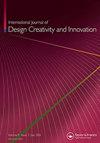设计健康的未来:让小学生参与健康报告卡的共同设计
IF 2.5
Q4 ENGINEERING, MANUFACTURING
International Journal of Design Creativity and Innovation
Pub Date : 2019-10-02
DOI:10.1080/21650349.2018.1473810
引用次数: 5
摘要
摘要建立和保持健康的生活方式对于确保孩子在一生中的健康和幸福至关重要。澳大利亚全国关注的是,近十分之三的儿童和年轻人超重或肥胖。儿童超重/肥胖也是全球关注的问题。扭转儿童肥胖趋势所需的能量不足对大多数儿童来说可能很小,但干预应该尽早开始并持续下去。儿童可以积极参与为社会创造新的社会规范,但这一点往往得不到承认。社会倾向于将儿童定位为被动的旁观者,和/或在创造供学校和其他机构(如医疗保健中心)使用的文物时赋予他们肤浅的角色。为了支持在小学环境中改变健康的生活方式,提出了一个体育活动和生活方式管理成绩单系统,用于儿童人体测量成绩标准的进展、监测和报告。为了使这个系统成为一个有效的沟通工具,它的设计不仅要在视觉上吸引人,易于使用,还要让父母和孩子对设计有主人翁意识,并使其被更广泛的社区接受。本文描述并讨论了使儿童和设计师能够开发PALM卡的共同设计方法,并对儿童对健康习惯和行为的感知提供了一些理解。本文章由计算机程序翻译,如有差异,请以英文原文为准。
Designing healthy futures: involving primary school children in the co-design of a health report card
ABSTRACT Establishing and maintaining a healthy lifestyle is essential in assuring a child’s health and wellbeing over the life-course. Of national concern in Australia is the fact that nearly three in every 10 children and young people are overweight or obese. Childhood overweight/obesity is also a global concern. The energy deficit needed to reverse the trend in childhood obesity may be quite small for most children however that intervention should start early and be sustained. Children can be active participants in creating new social norms for society but this is not often recognized. Society tends to position children as passive spectators and/or gives them superficial roles in creating artifacts for use in schools and other institutions such as health care centers. In order to support healthy lifestyle change in primary school settings, a Physical Activity and Lifestyle Management (PALM) report card system for progression, monitoring and reporting of anthropometric achievement standards for children has been proposed. In order for this system to be an effective communication tool it needed to be designed in a way that would not only be visually appealing and easy to use but would also allow parents and children to take a sense of ownership of the design and enable it to be accepted by the wider community. This paper describes and discusses the co-design approach that enabled children and designers to develop the PALM card and to provide some understanding of children’s perceptions of healthy habits and behaviors.
求助全文
通过发布文献求助,成功后即可免费获取论文全文。
去求助
来源期刊

International Journal of Design Creativity and Innovation
ENGINEERING, MANUFACTURING-
CiteScore
3.80
自引率
27.80%
发文量
15
期刊介绍:
The International Journal of Design Creativity and Innovation is an international publication that provides a forum for discussing the nature and potential of creativity and innovation in design from both theoretical and practical perspectives. Design creativity and innovation is truly an interdisciplinary academic research field that will interest and stimulate researchers of engineering design, industrial design, architecture, art, and similar areas. The journal aims to not only promote existing research disciplines but also pioneer a new one that lies in the intermediate area between the domains of systems engineering, information technology, computer science, social science, artificial intelligence, cognitive science, psychology, philosophy, linguistics, and related fields. The journal covers, but is not restricted to, the following topics: ·Theories on Design Creativity and Innovation ·Cognition of Design Creativity ·Innovative Process ·Inventive Process ·Analogical Reasoning for Design Creativity and Innovation ·Design Synthesis ·Method and Tools for Design Creativity and Innovation ·Representation of Design Creativity and Innovation ·Education for Design Creativity and Innovation ·Concept Generation and Inspiration.
 求助内容:
求助内容: 应助结果提醒方式:
应助结果提醒方式:


